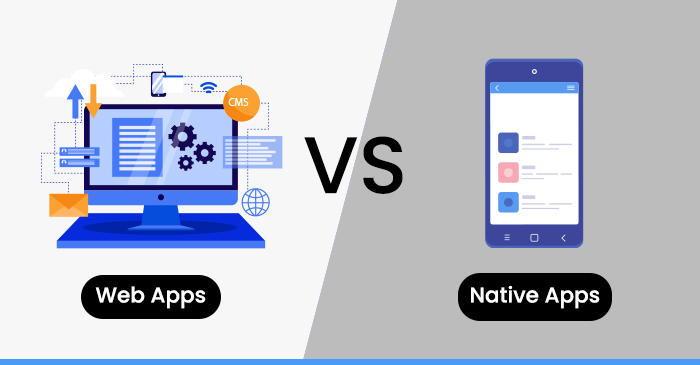
Every business owner wants to create an app for their brand for better accessibility and more traffic on their website. Creating an app for your brand may seem excellent, but you must know the difference between progressive web apps vs. native apps vs. hybrid apps. Understanding the difference between hybrid vs. native apps will help you determine which app best suits your business to push it onward and upward.
This is extremely relevant because we are witnessing the internet age and digital marketing is the prime source of advertising. According to a 2017 US mobile app report, 87% person users spend their time on mobile apps, and 13% spend their time on web apps. Additionally, the number of mobile app users has been increasing each year. We have added everything business owners should know about progressive web apps vs. native apps in this blog.
Native Apps
Native apps are designed for smartphones compatible with the Android operating system and iOS. You can download native apps from Google Play and App Store. The major difference between progressive web apps vs. native apps is that the latter is designed for specific devices. Android apps are written in Java, whereas iOS apps are written in Swift of Objective-C. Measuring the advantage of native app vs. hybrid app reveals that native apps are more reliable, fast, and serves a better user experience. Native apps are compatible with all device features, including a camera, microphone, GPS, and storage. The downside of a native app is its maintenance cost. When you compare native vs. hybrid apps, the former requires a bigger budget to function on multiple platforms with frequent updates.
Progressive Web Apps
The main difference between progressive web apps vs. native apps is that the web apps are optimized websites compatible with mobile browsers. Web apps can run on leading mobile browsers like Chrome and Safari. Moreover, web apps are written in JavaScript and HTML5, unlike native or hybrid apps. These websites are less expensive to develop and are designed along the mobile apps inclusive of interactive features. Progressive web apps can be designed without any complexity. Their biggest drawback is inaccessibility through app stores; they are slower and less intuitive.
Hybrid Apps

Which is better; progressive web vs. native vs. a hybrid app? As the name suggests, a hybrid app is a combination of web and native apps. It is written in JavaScript and HTML5 programming languages and is accessible through a web browser and app stores. These apps can access the built-in capabilities of the devices they are used in. cross-platform frameworks like Ionic, Xamarin, Sencha, etc. are used to build these apps. The advantage of hybrid apps over progressive web apps vs. native apps is that they are faster and easier to develop and use with minimum maintenance.
Progressive Web Apps vs. Native Apps

Progressive web apps vs. native apps both have their advantages and disadvantages. Before opting for one app for your business, you must consider the pros and cons. Here we have contrasted the two to help you choose one for your brand.
1. Marketing Insight
PWAs might be the best option if you’re still in the early stages and want to ship rapidly (or gain initial traction). Launching Android and iOS apps requires specialized development teams when using the native technique. Additionally, the app store approval process may take longer than anticipated. On the other hand, progressive web apps take less time to develop and release because they are essentially just websites. It may be designed and released fast to obtain crucial market and user information. Additionally, you do not need to wait for app store validation, which is necessary for publishing and distributing native apps through Apple’s and Google’s respective app stores.
2. Cost of Development
Because you have to create both versions individually if you want completely native functionality, native apps are expensive to create. Objective-C or Swift are used to create apps for iOS users, whereas Java or Kotlin is utilized to create native apps for Android. Two diverse development tech stacks result in a larger team and higher team costs. Additionally, the distinct codebases result in hefty maintenance costs. The high cost is a significant barrier for entrepreneurs in their early stages who wish to gain initial momentum and customer input. In contrast, creating PWAs is simpler and less expensive because they are web apps created to work on any mobile device, regardless of the platform.
3. Cross-Platform Availability
Is PWA vs. native app available on cross-platforms? You cannot concentrate on a single platform and release a native app for only Android or iOS if you want to reach more people or if your audience is fragmented. To reach your clients and provide a better experience on mobile devices, you will need to develop and create the apps individually for both platforms, but doing so will require more time and resources. Regardless of the platform people are using, progressive web apps are being developed to be responsive and can make it simpler (and faster) to connect with users. PWAs have the potential to dramatically increase engagement rates because of their widespread availability and attractiveness.
4. Downloading & Installation
Simple workflows and ease of use are favorites among mobile users. Most people search for a solution on the go rather than installing an app solely for information or one-time use. Additionally, users are hesitant to provide native app access to their phone’s storage, location, etc., due to growing privacy concerns. You benefit from using PWAs in this situation. Unlike native mobile apps, a user does not need to install a PWA to discover information, communicate with a company, or make a transaction.
5. Performance
PWA vs. native app, which performs better? Progressive web apps operate on a third-party browser, but they load faster. This implies that there will always be a potential for lag and substantial battery use. On the other hand, once installed, a native app seamlessly becomes a part of the smartphone. Compared to PWAs, it can utilize the hardware and device features better. Additionally, due to the platform-centric coding, native mobile applications are more potent and achieve excellent performance ratings.
6. Features & Functions
Progressive web applications can’t always offer the capabilities and functions that native apps can. Geofencing, NFC-based mobile payments, inter-app connectivity, and smart sensors don’t work well with a PWA. Additionally, a PWA cannot offer push alerts to iOS users. For that, you need a native app. Therefore, you should consider developing native apps if you want to use push notifications or any of the abovementioned capabilities.
7. Offline Availability
PWAs can deliver portions of the web app simultaneously, promising offline functionality. PWAs have restrictions if the user requests any information (or feature) that isn’t covered by the built-in caching system. Consider it this way: You can explore the app’s static pages, but you can only submit a form once connectivity has been restored. Native apps, on the other hand, do far better in this regard. Even if the user is not online constantly, a native app will give a consistent experience (information and offline functionality).
Conclusion
Every developer ponders what is an advantage of using web apps. The simplest answer is; web apps are better because they are more responsive, cheap, and easier to use. However, based on the objectives of your project, you should decide whether to use progressive web apps vs. native apps. Choosing a compatible mobile app development for your startup or company would be best. Before creating any progressive web apps vs. native apps, consider all the advantages and disadvantages.
You should use a progressive web app because it doesn’t require downloads if your users are data-conscious and value their time. However, you might consider developing a native app if you need advanced features and want to be on the app store for brand credibility.
Arturo Digital is a creative and custom mobile app development company in the US. For startups, businesses, and partners, it offers application design and development services on the iOS and Android platforms. Contact the Arturo Digital team, and we’ll get back to you to go over the applications that will work best for your brand.
Read more: How Mobile App Revolution Can Make Business More Profitable